Recent developments in the international arena indicate some major shifts in global affairs. One of the key trends discernible in these shifts is the emergence of multipolarity and growing regionalism around the world.
There are several examples illustrating the increasing strength and salience of regionalism, e.g. organisations/ unions such as the Shanghai Cooperation Organisation (SCO), Conference on Interaction and Confidence Building Measures in Asia (CICA), African Union (AU), and the European Union (EU), to name a few.
Notably, since the onset of the Russia-Ukraine conflict, the Eurasian Economic Union (EAEU) is one regional organisation being researched and widely discussed by political analysts and experts of international relations.
Background:
EAEU, widely viewed as a consequence of the dissolution of the Soviet Union (SU) and Russia’s response to EU overtures is “an international organization for regional economic integration.”[1]
EAEU’s main objectives are to ‘comprehensively upgrade, raise the competitiveness of and cooperation between the national economies, and to promote stable development in order to raise the living standards of the nations of the Member-States.’ And it plans to achieve these objectives by “ensuring free movement of goods, services, capital and labour, pursue coordinated, harmonized and single policy in the sectors determined by the Treaty and international agreements within the Union.”[2]















